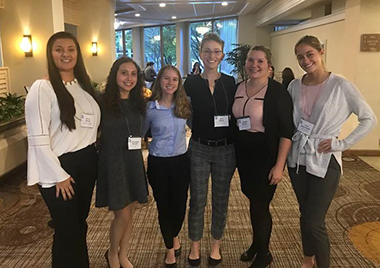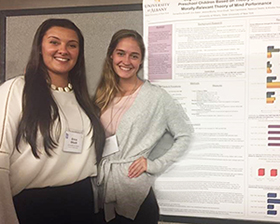New Student Avenues for Research
 |
|
The UAlbany Social Cognition in Preschoolers (SCIP) Lab team poses at the Cognitive Development Society conference in Portland, Ore. Left to right, Erica Shudt, Samantha Bordoff, Rebecca Swartz, Erin Baker, Jessica Murray and Tara Caemmerer. |
ALBANY, N.Y. (April 19, 2018) — When senior Tara Caemmerer presents at the 15th Undergraduate Research Conference on April 27, she will be the first student from the School of Education (SOE) ever to do so.
The simple reason is that before Fall 2016, SOE didn’t have an undergraduate major to produce an undergraduate researcher. But, with the interdisciplinary Bachelor of Science in Human Development, not only is the School being represented, but talented students such as Caemmerer are finding avenues to research they otherwise might never have been able to explore.
Caemmerer was an underclassman studying psychology when the Human Development major came along. She said she immediately took to it as a second major field: “It gave me the opportunity to continuing studying psychology, but also provided me with the necessary knowledge to work towards my goal of becoming an occupational therapist.”
It also led to research. “The first class I took for my new major was Lifespan Development with Dr. Erin Baker,” she said. “I immediately clicked with her and asked if I could join her research team. We were both very excited to work together.
“The research that is conducted in Human Development is unique. I travel to schools in the Albany area and interview children between the ages of 4 and 7. You learn about their own development.”
Other Human Development majors, including Erica Shudt and Rebecca Swartz, followed Caemmerer’s path, becoming part of the Social Cognition in Preschoolers (SCIP) Lab, a team of graduate and undergraduate researchers in Educational and Counseling Psychology whose research focuses on development during early childhood.
National Conference Experience
 |
|
In Portland, Human Development majors Shudt and Caemmerer stand before a poster presented by grad student Samantha Bordoff and authored by the full Social Cognition in Preschoolers Lab.
|
Working directly under SCIP graduate students, the trio presented research at School of Education Day last August, and then in October assisted Ph.D. students Jessica Murray and Samantha Bordoff in their presentations at the Cognitive Development Society conference held in Portland, Ore. The students were all listed as co-authors on three studies authored by Baker, an assistant professor in Educational Psychology & Methodology.
“The conference in Portland was truly an incredible experience for me,” said Shudt, also a senior with a double major in psychology, as well as a student in the BA/MS program in Mental Health Counseling. “Our research team was able to accompany Dr. Baker and listen in on a lot of new research being done in the field of cognitive development. We were able to network a lot with researchers and psychologists from all over, which I know was really beneficial to a lot of us.”
Baker says the Human Development majors made strong contributions to the work of SCIP. “For the purposes of the conference, undergraduate students helped graduate students by aiding their preparation of materials, such as assisting with conducting literature reviews,” she said. “Erica and Tara assisted on all projects and Rebecca is the lab manager responsible for the recruitment and scheduling for all the projects.”
The trio also presented in Portland at a poster session, where they met some of the leading researchers in the field. “One woman came up to us and found our research very interesting,” recalled Caemmerer. “She offered her contact information to us so we could collaborate on future projects together. After she walked away, we realized this was Dr. Melanie Killen, the woman who developed the theory that guides most of the research in our SCIP lab.”
Integral Research
Dayna Newton, academic and administrative coordinator of the Human Development major, spoke of the importance of research to the program. “There are certain concentrations, such as the educational psychology concentration, where students are required to take a course where they design and implement their own research project,” she said.
“In the other concentrations where research is not required, if the student expresses interest in a doctoral program I advise them to at least get a year of research under their belt before applying to grad school. There are a few professors in our department now that have undergraduates working closing with them on research and more that have expressed interest in obtaining students for the coming fall semester.”
“This major really does allow its students to explore whatever they chose to,” said Shudt. “All of the faculty and staff work so closely together that it is easier than some majors to find someone to do research under. All of the professors take so much pride in their work that it is honestly contagious and a pleasure to work with any of them.”
![]() For more news, subscribe to UAlbany's RSS headline feeds
For more news, subscribe to UAlbany's RSS headline feeds
A comprehensive public research university, the University at Albany-SUNY offers more than 120 undergraduate majors and minors and 125 master's, doctoral and graduate certificate programs. UAlbany is a leader among all New York State colleges and universities in such diverse fields as atmospheric and environmental sciences, business, education, public health,health sciences, criminal justice, emergency preparedness, engineering and applied sciences, informatics, public administration, social welfare and sociology, taught by an extensive roster of faculty experts. It also offers expanded academic and research opportunities for students through an affiliation with Albany Law School. With a curriculum enhanced by 600 study-abroad opportunities, UAlbany launches great careers.


